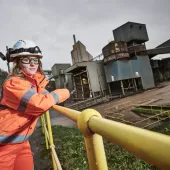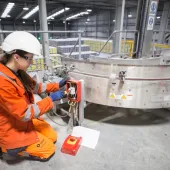Training Plant Operators and Site Engineers

First published in the February 2015 issue of Quarry Management as A Valuable Asset
Trained operators are valuable assets, not just a health and safety compliance. CDE’s global service manager, Ryan Barker, explores the advantages of ensuring plant operators and site engineers receive regular and adequate training
Everyone is aware of the tight legislative requirements with regard to on-site safety and the operation of machinery. Quarrying has inherent dangers and it is from this premise that the industry is so heavily governed by health and safety laws. There is a legal onus on companies to provide adequate frameworks of training to ensure that everyone working within this type of environment is competent for the work they carry out on a daily basis, as laid out in The Provision and Use of Work Equipment Regulations 1998, Part 2, Regulation 9 (1). But what about the other effects that the provision of adequate training can have on both general site operations and the business as a whole?
Very often employers do not recognize the added value of trained operators over and above the legal requirements. Obviously, the primary focus for a company is to provide a safe working environment for employees, but other benefits exist and are often undervalued.
In the UK, training is required by the Occupational Safety and Health Administration (OSHA) for any employees who operate quarry equipment. It has become standard practice, therefore, to ensure that operators are properly trained to have the experience and knowledge to work safely at all times, and part of this basic requirement includes the delivery of on-site inductions for all new individuals to site.
Benefits to the employer
Setting aside the legislative tick-box exercise, of which training is a prerequisite, adequate job-specific training can lead to substantial benefits for the employer and the workforce. This can include enhancing morale by raising operator confidence, reducing accidents and work-related injuries, reducing any potential damage to the plant, minimizing plant repairs and increasing overall plant uptime and productivity. These benefits can help to substantially improve overall site processes and ensure smooth operation of the plant.
From recent experience, a company that did not wish to pay for on-site labour assistance assigned one of its untrained operators with the task of replacing a vibrating motor. Vibrating motors need to be torqued to the correct level to ensure that they remain secure given the intensive vibration they are subject to. In this particular case, however, the replacement motor dismounted itself after just a short period of time and damaged the upper screening deck, resulting in the cost of replacement parts and days of downtime before the plant was back in operation.
Having competently trained operators is critical, as in this instance the problem would have been avoided had the appropriate training been put in place. With plant-specific training, the savings would have been substantial for the customer.
Most providers of quarry equipment offer training programmes that can be tailored to a specific company’s requirements. The most valuable approach is training conducted on site within the environment where the operators will be working daily. Moreover, companies which provide tailored plant solutions should understand that your training requirements should reflect this and their programmes should be designed and delivered with this in mind.
Training at an advanced level will allow operators to fully appreciate all the intricacies of the plant in question and how each part affects the overall process. This could focus on optimization techniques to ensure that individuals have the skills necessary to operate, maintain, optimize and recommission the plant.
When an operator fully understands how their plant operates from the initial feeding of raw material to the stockpiling of the commercial end product, they are aware of the mechanics of the plant and, therefore, the operational requirements. Whether it is from a virgin aggregate quarry, a mine or a construction and demolition waste-recycling plant, the raw material is subject to change and, as a result of this, the operational requirements will need to be modified accordingly. To maximize the commercial value of the product, it is essential that an operator can succinctly identify any change in raw feed and have the specific knowledge to make the necessary plant modifications. These changes can range from cleanliness, levels of contamination, grade of material and chemical make-up, which can all have an effect on the quality and value of the end product. A trained operator will have the knowledge to implement changes to avoid this.
Moreover, if companies have their own ‘in-house expert’, this will, ultimately, save money by avoiding costs associated with on-site labour charges. Trained, competent operators will have the required skills to change complex parts of the plant and diagnose or prevent any potential issues, which will ensure maximum uptime.
Refresher training and re-certification
Although companies today are more meticulous about operator training and credentials for new employees, employers must also consider the benefits of refresher training. Operators who have previously been trained and only require an updated focus on certain aspects of the plant, or perhaps at a more advanced level to enhance their knowledge of, for example, certain maintenance tasks, should be afforded the opportunity to build on this. Training of this nature should focus on specific needs where an operator has been found to be less competent in certain aspects of plant operation, rather than the adoption of a blanket approach.
This will result in a more efficient, skilled operator as opposed to just another administrative exercise. Not only will the operator in question have improved and enhanced their knowledge of a particular aspect, the employer will have a site operator who is able to perform and operate tasks competently without supervision.
However, the work here does not end once an operator is trained initially. It is strongly recommended that all plant operators’ performance be reassessed and re-certified at least once every three years, and this responsibility lies solely with the employer. The purpose of this is to identify any training gaps or requirements that would aid the operators’ performance and, ultimately, benefit the company overall. It is imperative, therefore, that employers certify and document appropriately trained operators and retain a record of their performance. A re-evaluation of a previously trained operator is also necessary where an operator has, perhaps, been shown to underperform in certain tasks or had involvement in an accident or near-miss situation. What is also imperative is that training is delivered for those operators who have been assigned to a different type of plant or the plant has been developed or changed in some respect. Regardless of the area and level of training, relevant copies of certificates should also be issued by the company delivering the training and these should reflect the nature of what was covered.
If training is not delivered, is not adequate or is not properly documented, regulatory bodies can levy fines on a company that is not compliant with the requirements.
Additionally, a company may hire a new plant operator who was recently trained by his or her previous employer. However, this does not remove the onus from the current employer; the company is still under a legal obligation to evaluate this new operator to ensure that the appropriate training specific to their plant is suitable and adequate.
Operator training – a valuable investment
Everyone working with plant and equipment in quarries and mines and other similar working environments must be competent in the work they do. They must be properly trained and have the experience and knowledge to work safely. In addition, training will often be required for people taking on new responsibilities or using new features of the plant in question. The benefits of having trained operators are, therefore, manifestly obvious; the primary benefits are two-fold. Aside from the legal requirements and for a fraction of annual expenditure, training is a cost-effective strategy which can result in a high return on investment through reduced maintenance costs, increased productivity and high-quality products.
Training is a critical factor in providing site operatives with an understanding of how they can support and maximize the achievement of maximum throughput of material. Properly trained employees better understand the operation of the plant, resulting in more efficient operations. Training is, therefore, time and money well spent. Rather than an expense, it is an investment that can result in fewer injuries and lower insurance premiums. An effective plant operator training programme can maximize uptime and increase productivity, benefiting the employee, the company and, ultimately, the customer.
- Subscribe to Quarry Management, the monthly journal for the mineral products industry, to read articles before they appear on Agg-Net








